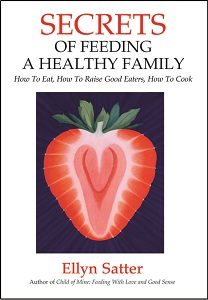

Family Meals Focus
The Ellyn Satter Institute Newsletter
Eating competence: Eating attitudes
by Ellyn Satter, Registered Dietitian and Family Therapist
Competent eaters have positive attitudes about eating and therefore are relaxed about it. They enjoy food and eating and they are comfortable with their enjoyment. They feel it is okay to eat food they like in amounts they find satisfying.
Most people feel ambivalent and anxious about eating
Your attitudes about eating can make or break you. Unlike what we think (our conscious judgment) attitudes are based on feelings and beliefs, both often unexamined. Attitudes are generally subtle and implied rather than spoken right out loud, and are, in fact, often hard to pin down. But they affect you nonetheless. They control your behavior, influence the way you feel, and dictate your priorities. In contrast to competent eaters’ perfectly normal and highly desirable attitudes about eating, most people today feel more or less ambivalent and anxious about eating and doubt their ability to do a good job with food management. They carry around standards of what and how much they should eat, often ill-defined, and feel ashamed of themselves when they eat and enjoy food that falls short of their standards.1
EC addresses national neurosis about food and eating
Competent eaters are emotionally and socially healthier than people with low levels of eating competence.
The eating competence model says it is good to eat as much as we want of food we enjoy. However, we don’t trust our food longings, and certainly don’t feel comfortable acting on them. As a matter of fact, we suffer from a national neurosis about eating. Surveys find that we try not to eat the foods we enjoy in amounts that we find satisfying and instead feel obligated to eat ”nutritious food” in amounts that leave us hungry, or at least unsatisfied.2 In the last 20 years, the percentage of people who acknowledge enjoying eating decreased from 48% to 39%.3 Eating ”enjoyably” comes loaded with guilt and fear; eating ”properly” comes loaded with control and dreariness. Many times we careen from one to the other, like the respondents to a 2005 Parade magazine survey who say they eat a healthy mix of foods, then reward themselves with ”pleasure foods.”4
Eating competent people do better emotionally and socially
ecSatter research findings showed evidence that competent eaters do better with feeding themselves and have positive health indicators.5 None of that surprised me. What did surprise me, although it shouldn’t have, is that competent eaters are emotionally and socially healthier than people with low levels of eating competence. They feel more effective, they are more self-aware, and they are more trusting and comfortable with themselves and with other people.6 Allow the psychotherapist in me to explain these findings. Consider that being emotionally and socially healthy, emotionally competent, if you will, depends on the same processes: being sensitive to and comfortable with what goes on inside you, knowing what you feel, what you want, who you are, and being honest with yourself and with others about it. Your comfort and honesty with yourself allow you to act on your feelings in a rational and productive way. You can appreciate not only your own feelings and wishes but those of others and, as a consequence, be reasonably adept at working things out.
Be good to yourself: Be eating competent
Being eating competent means you can be comfortable and honest with yourself about what you want and need. That lets you be matter-of-fact about responding to your wants and needs. What could be better?
References
1. Satter EM. Eating Competence: definition and evidence for the Satter Eating Competence Model. J Nutr Educ Behav. 2007;39 (suppl):S142-S153.
2. American Dietetic Association. Nutrition Trends 2002: Final Report of Findings. Chicago: The American Dietetic Association; 2002.
3. Taylor P, Funk C, Craighill P. Eating More, Enjoying Less. PEW Research Center Social Trends Report. Pew Research Center; 2006.
4. Hales D. What America really eats. Mark Clements Research; 2005.
5. Psota T, Lohse B, West S. Associations between eating competence and cardiovascular disease biomarkers . J Nutr Educ Behav. 2007;39 (suppl):S171-S178.
6. Lohse B, Satter E, Horacek T, Gebreselassie T, Oakland MJ. Measuring Eating Competence: psychometric properties and validity of the ecSatter Inventory. J Nutr Educ Behav. 2007;39 (suppl):S154-S166.
Explore
For more about being comfortable and honest with yourself about what you want and need, read chapter 2, “Adjust your attitude,” in Ellyn Satter’s Secrets of Feeding a Healthy Family.
Related issues of Family Meals Focus
- Eating competence
- Eating competence: Context-management skills
- Eating competence: Food acceptance
- Eating competence: internal regulation
- Eating competence: putting it all together
- Counseling with the Satter Eating Competence Model
- Versions of internally regulated eating
- Emotional eating

